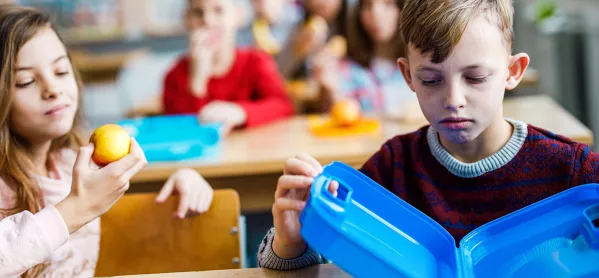Disadvantage gap ‘has little to do with social skills’

Disadvantaged pupils’ struggles at school have “little to do” with them lacking the character, attitude or self-belief of their wealthier peers, according to a new report.
A global study, by researchers at Cambridge, Zürich and Tübingen universities, challenges the view that the academic achievement gap between rich and poor children can be tackled by addressing differences in disadvantaged students’ mindset, work ethic and self-belief.
The researchers argue that the emphasis put on social skills by politicians and educators “risks blaming” disadvantaged children for their own misfortune.
The study, which analysed data from more than 240,000 15-year-olds in 74 countries, including the UK, found that the socioeconomic attainment gap was very large across all of the countries.
While children from wealthier backgrounds were found to have higher levels of socio-emotional skills on average, the impact of these discrepancies on the overall achievement gap was modest, according to the report.
- Disadvantage: The gap has widened across all educational phases
- KS4 performance data: Disadvantage gap widest since 2011
- Supporting disadvantaged pupils: a school leader’s guide
The researchers calculated that if disadvantaged children had the same social and emotional skills as wealthier children and their academic effects were consistent, the learning gap between them would reduce by no more than 9 per cent.
The study - which used data from the 2018 Programme for International Student Assessment (Pisa) - analysed both the science test scores and the school-relevant socio-emotional skills of the most and least advantaged quartile (25 per cent) of students in each country.
It found that the average difference in science test results between the most and least advantaged students was 70.5 points - which is equivalent to almost three years of schooling.
Tackling the disadvantage gap in education
Politicians and educators have suggested that the gap can be narrowed by developing the self-belief, work ethic and a growth mindset of poorer students, the report highlights.
A survey commissioned by the UK Cabinet Office in 2015 concluded that disadvantaged young people “were reported to have more to gain from social and emotional skills provision”.
A second commissioned review concluded that class-based inequalities in social and emotional skills “serve to perpetuate the cycle of advantage or disadvantage across generations”.
Former schools minister Nick Gibb previously stressed the importance of schools developing “character” traits among their pupils.
But the latest findings, published in the journal Sociology of Education, suggest that a lack of social and emotional skills has little to do with poorer students’ academic struggles.
The researchers argue that investment should be focused on supporting poorer children’s access to quality education, better resources and equal opportunities.
Lead author of the study Dr Rob Gruijters, from the Research for Equitable Access and Learning (REAL) Centre at the University of Cambridge, said: “Educational inequality cannot be solved through social and emotional learning.
“The idea that children can overcome structural disadvantage by cultivating a growth mindset and a positive work ethic overlooks the real constraints many disadvantaged students face, and risks blaming them for their own misfortune.”
Nicolas Hübner, assistant professor at the Institute of Education at the University of Tübingen, in Germany, and another co-author of the study, said: “Developing social and emotional skills is hugely valuable for children, but the evidence suggests it has little to do with why low-income students are more likely to struggle academically.
“According to our results, it is not a magic bullet for tackling the socioeconomic achievement gap.”
Paul Whiteman, general secretary of the NAHT school leaders’ union, said: “Schools do a great deal to try to mitigate the effects of disadvantage upon their pupils, but they cannot address the underlying drivers of poverty nor nullify all the impacts it has on children’s lives.
“The government hasn’t done nearly enough to support children’s recovery from the pandemic, tackle the root causes of poverty or properly fund social care, family support and mental health services, which have all been underfunded over the past decade.
“Until this changes, the disadvantage gap will continue to have a pernicious impact upon children’s life chances.”
Geoff Barton, general secretary of the Association of School and College Leaders, said: “Nobody in UK education thinks disadvantaged children struggle because they lack the ‘character’ or attitudes of wealthier children.
“They struggle because of the lack of basic amenities - food, warmth, clothing, secure housing, a space in which to study, lack of access to the books and technology resources that are available to other children, and many other factors which are intrinsically wrapped up in poverty.
“Social and emotional learning can help to build confidence but everyone knows this is not a solution on its own. That relies upon the government doing something about the fact that more than 4 million children in the UK live in poverty.”
A Department for Education spokesperson said: “Despite the impact of the pandemic, we are taking the long-term decisions to improve our education system for generations to come, including the new Advanced British Standard (ABS) which will see every student in England study some form of maths and English to age 18.
“We have made £5 billion available since 2020 for education recovery initiatives, with nearly five million tutoring course starts supporting pupils in all corners of the country, including some of the most disadvantaged.”
You need a Tes subscription to read this article
Subscribe now to read this article and get other subscriber-only content:
- Unlimited access to all Tes magazine content
- Exclusive subscriber-only stories
- Award-winning email newsletters
Already a subscriber? Log in
You need a subscription to read this article
Subscribe now to read this article and get other subscriber-only content, including:
- Unlimited access to all Tes magazine content
- Exclusive subscriber-only stories
- Award-winning email newsletters
topics in this article



